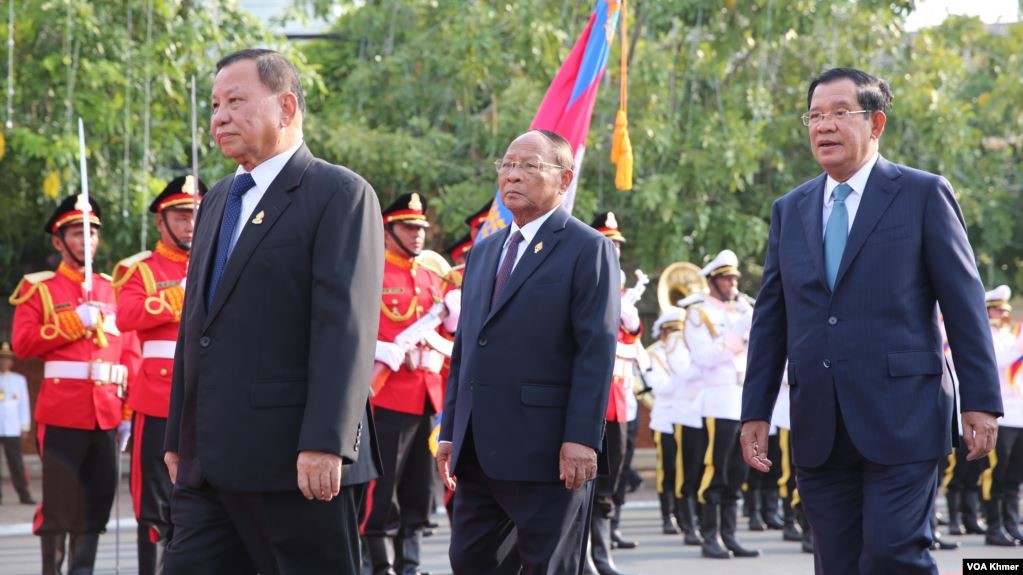COVID-19 legislative response in Cambodia
The COVID-19 pandemic has brought significant levels of pressure on many governments, requiring them to implement new regulations and policies to reduce the spread of the virus. In Cambodia, the socioeconomic challenges posed by the pandemic mainly come from the reduction of commercial operations at the national and international levels, especially the drastic fall in international tourism. The Cambodian Government has introduced emergency regulations to curb the spread of the virus as well as to cope with the negative spillovers affecting the economic activity of the country.

Left to right: Senate President Say Chhum, President of National Assembly Heng Samrin, and Prime Minister Hun Sen commemorate Cambodia’s National Independence Day, in Phnom Penh, Cambodia, November 9, 2019. (Hul Reaksmey/VOA Khmer)
The number of cases and the incidence rate in Cambodia are low compared to many countries around the world and, according to the World Health Organization, a significant proportion of coronavirus cases (84%) are imported.1 Given the high share of imported cases, Cambodia established restrictions on international travel. In parallel, the government issued an extension on tourist visas and exempted visa overstay fines on foreigners stranded in Cambodia due to the pandemic.
At the outset, travelers from countries with high transmission rates of the virus, namely United States, Germany, France, Spain, Italy, and Iran, were banned from traveling to Cambodia in order to mitigate imported cases, and other countries were later added to the list. Cross-border movements were also suspended as Cambodia temporarily closed its border with Vietnam.
Travelers returning to Cambodia from other countries were also required to undergo a 14-day quarantine as a precautionary measure against coronavirus. However, since May, the Cambodian government has eased international travel restrictions by allowing foreign travelers from nations such as Italy, Spain, and France.2 People arriving from other countries are required to have a negative test taken in the last 72 hours and they must also hold health insurance of $ 50,000 to cover treatment costs in case the person is infected.
A state of emergency law was passed as a measure that could be implemented if necessary to thwart the spread of the coronavirus and ensure the safety of Cambodia’s population. The law gives the Government extraordinary powers, such as telecommunications surveillance, to manage the country during emergencies like pandemics.3 The adoption of the state of emergency law attracted significant attention due to its implications for human rights and freedoms at a moment when Cambodia already faced criticisms around the deterioration of human rights. Limited transparency and consultation are some of the limitations of implementing a state of emergency in Cambodia.4
One of the first measures to curb community transmission consisted of local travel restrictions. In April, the Government issued a travel ban and movement restriction.5 Inhabitants of Phnom Penh were not allowed to leave the city while those living outside the capital were not allowed into the city nor to other Cambodian provinces. Despite a halt in movements to contain the spread of the virus, specific groups were exempted from travel restrictions, including factory workers, government officials and emergency service workers.6 People in need of healthcare services were also allowed to travel to health facilities if they followed preventive measures, such as traveling in groups not exceeding four individuals.
Another measure adopted was mandatory quarantine for people who might have had contact with an infected person. The Phnom Penh City Hall prepared 37 schools as quarantine centers to host 15,000 workers who returned to the capital.7 The 14-day mandatory quarantine was critical in ensuring the returnees were tested for coronavirus and to limit community spread. Healthcare workers and members of the public were also urged to wear masks and regularly wash their hands to reduce the risk of contracting the virus.
Another notable government measure was the closure of schools and educational institutions. All public and private learning institutions were closed indefinitely two months after Cambodia confirmed its first case of coronavirus.8 The Ministry of Education, Youth and Sport (MoEYS) issued the directive to protect learners from contracting the virus and ensure the safety of the population. MoEYS encouraged distance and e-learning, through television and online platforms, to allow learners to continue with their education programs from home. However, limited technology and equipment left many students without education for months. There are fears that this might increase school dropouts and child labour as some students have been working throughout this period to support their families.
The government provided a fast and effective response to control the spread of the virus through the state of emergency law, movement restrictions and quarantine periods. However, the consequences of the virus on the economy and social aspects remains to be seen and these will likely require further action.
Blog written by: Ms. Angela Maria Maalouf, ODC Research Intern.
References
- 1. World Health Organization (2020). Cambodia Coronavirus Disease 2019 (COVID-19) Situation Report #5. Retrieved from: https://www.who.int/docs/default-source/wpro—documents/countries/cambodia/covid-19/covid-19-joint-who-moh-sitrep-05.pdf?sfvrsn=845addf3_2
- 2. Castillo, G. G. (2020). Cambodia COVID-19 Situationer. Retrieved from: https://focusweb.org/cambodia-covid-19-situationer/.
- 3. Ibid.
- 4. Touch, D. (2020). Cambodia’s State of Emergency Law and the Fight against COVID-19. Retrieved from: https://www.asiapacific.ca/publication/cambodias-state-emergency-law-and-fight-against-covid-19
- 5. Turton, S. (2020). Cambodia issues order banning travel to and from Phnom Penh. Retrieved from: https://asia.nikkei.com/Politics/Cambodia-issues-order-banning-travel-to-and-from-Phnom-Penh
- 6. Ibid.
- 7. Sen, D. (2020). Mandatory quarantine to help prevent coronavirus spread. Retrieved from: https://www.khmertimeskh.com/50714122/mandatory-quarantine-to-help-prevent-coronavirus-spread/
- 8. Castillo, G. G. (2020). Cambodia COVID-19 Situationer. Retrieved from: https://focusweb.org/cambodia-covid-19-situationer/

